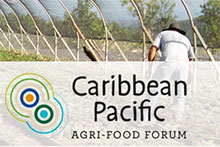Agrifood development in the spotlight – sharing experiences across regions
 Bridgetown, Barbados, 31 October 2015/ ACP: A five-day event aimed at promoting synergies between the Caribbean and Pacific to spur agrifood development takes centre stage in the coming week in Bridgetown, Barbados.
Bridgetown, Barbados, 31 October 2015/ ACP: A five-day event aimed at promoting synergies between the Caribbean and Pacific to spur agrifood development takes centre stage in the coming week in Bridgetown, Barbados.
The first Caribbean and Pacific Agrifood Forum, organised by the ACP-EU Technical Centre for Rural and Agricultual Cooperation (CTA) and partners from November 2 to 6, will seek to harness cross-learning between policy-makers, private sector players and farmers' representatives as a way of harnessing innovative solutions that can benefit the agrifood sector in both regions.
With an action-oriented and people-centred approach, the Forum will feature a rich programme of workshops, meetings and opportunities for networking between some of the more than 250 participants expected to attend. Creating a business environment for agrifood production and marketing will be a strong focus throughout the week, with a particular emphasis on how small-scale producers can become part of dynamic and inclusive value chains. Young people will receive special attention, with sessions that examine the potential of ICTs to draw them into the agrifood sector.
As small island developing states (SIDS), the Caribbean and Pacific regions share a number of features and challenges. Both have scattered and remote locations, which causes difficulties for agricultural production and accessing markets. With agriculture in decline as a generator of income, both regions face problems of food security and nutrition, linked to high levels of food imports. And both are vulnerable to natural disasters and climate change.
Agriculture and tourism
On the positive side, the two regions have strong potential for developing agrifood value chains linked to the burgeoning tourism sector. The Forum will address scope for targeting this area and the role of chefs in linking agriculture and tourism will be examined during a special session on November 7.
A selection of 12 workshops scheduled for the first three days will offer hands-on training in social media and Web 2.0 tools, present ICTs for fisheries, explore how to create a successful agribusiness company, examine value chain development and inclusive business models and much, much more. Other themes will be the agriculture–nutrition nexus, policy advocacy for Caribbean and Pacific farmers' leaders, improving access to finance, strengthening the link between agriculture and nutrition, successful initiatives to counter climate change and the genesis of a virtual incubator for young agripreneurs in the Caribbean.
The final two days of the event – November 5 and 6 – will be dedicated to the 2nd Caribbean Agribusiness Forum – Strengthening the agrifood sector and expanding markets, which will examine the main drivers of agribusiness development and present success stories from both regions.
A wide array of side events will be on offer throughout the week, as well as a series of sessions scheduled to promote opportunities for business networking, with an eye to future collaborations.
Read the Forum's background and programme
